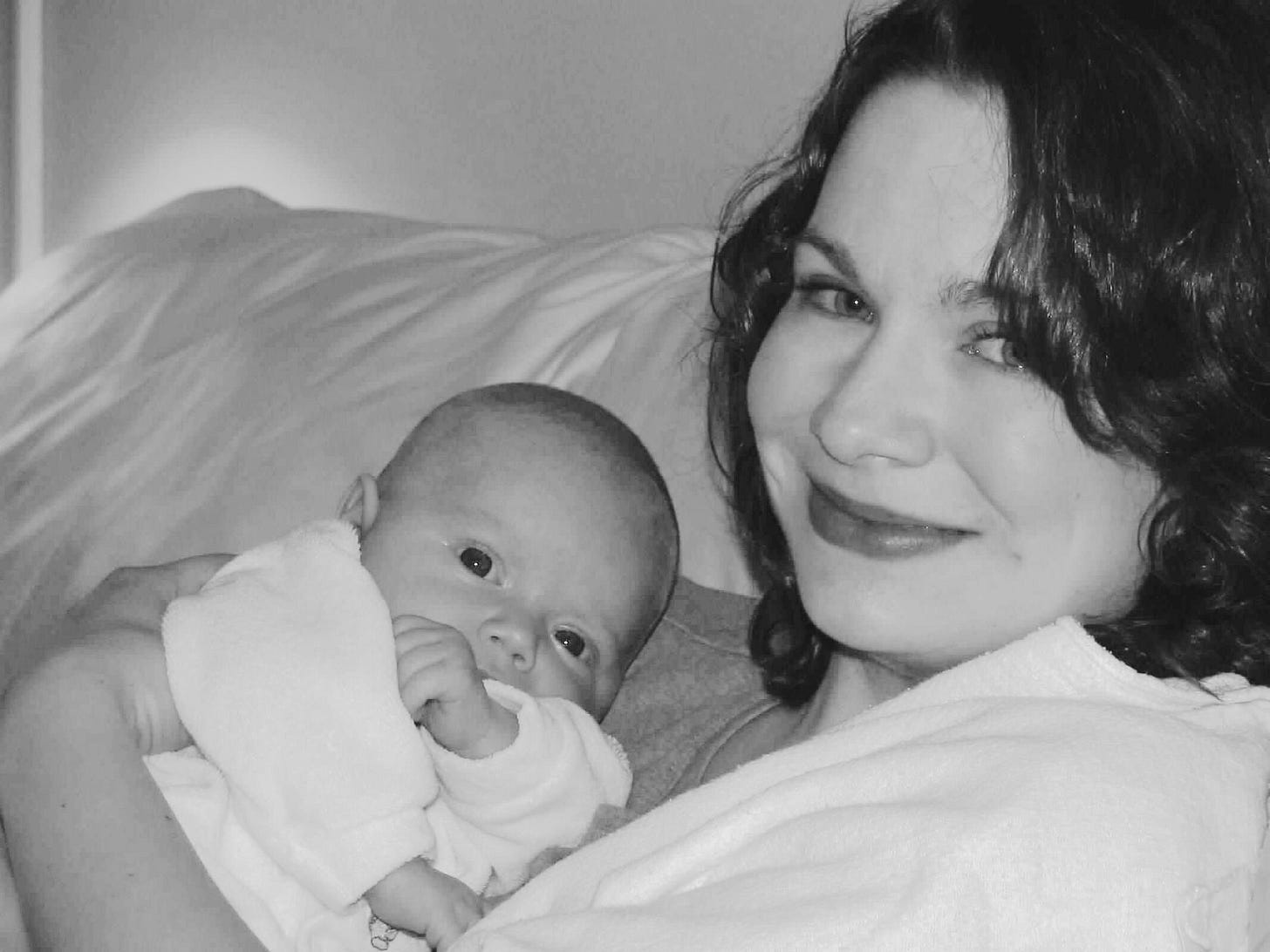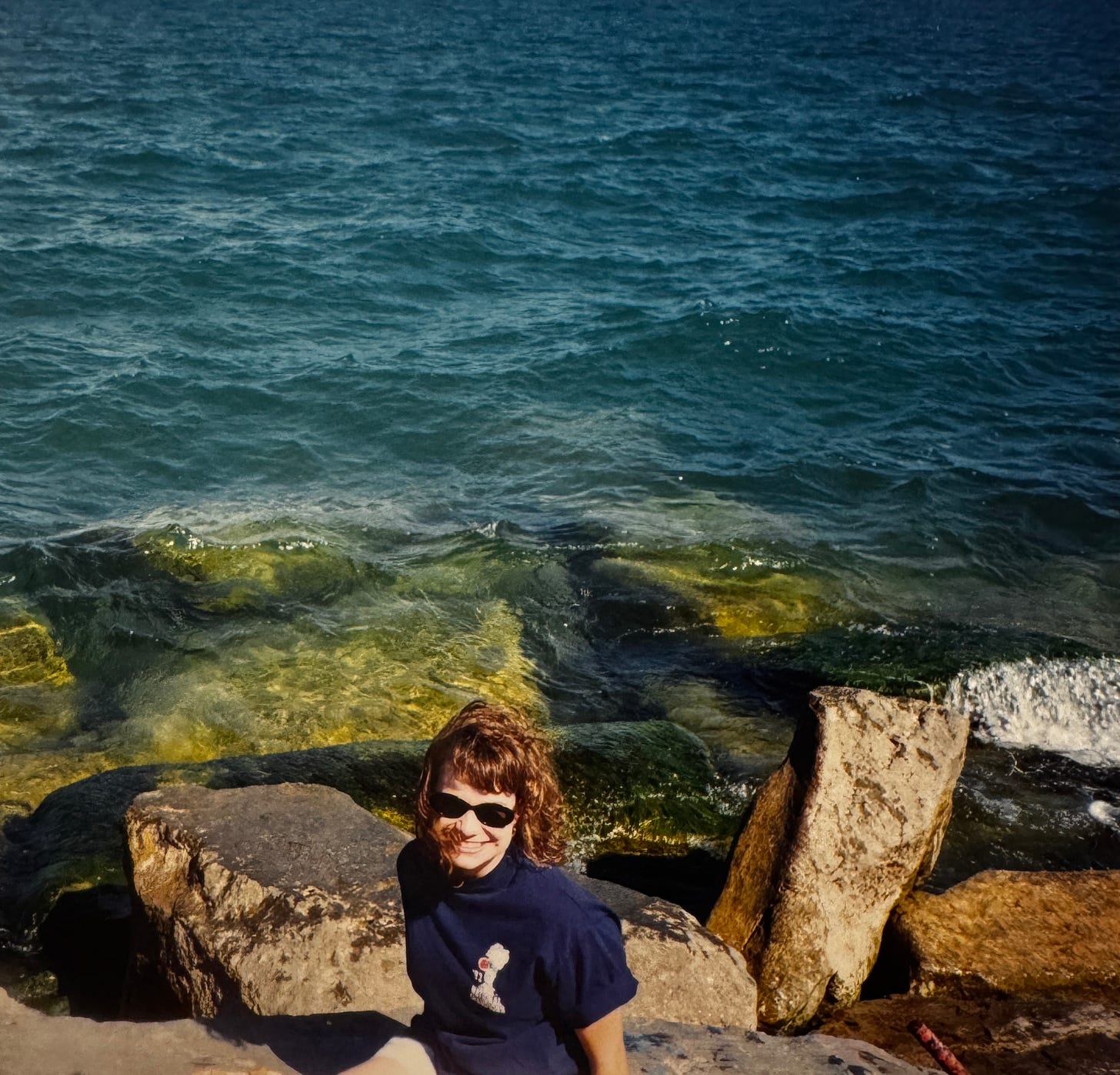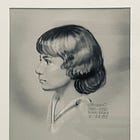When I was a new mother of a three-week-old baby, I began dialing the pediatric on-call nurse in the middle of the night. I did this because I had no idea what I was doing. I did it because I had been told that I had no maternal intuition—at least, compared with mothers who had come before me in my family. I called because I had produced a baby who had enormous blue eyes but no interest in what the parenting books said should happen.
She was a born editor.
I fed Janie but Janie cried. I changed Janie but Janie cried. I rocked Janie but Janie cried. Her tears fell like a slashing red pen each night on my prenatal proposal for How This Is Supposed to Go—which, along with sleep deprivation and an actual book proposal I was laboring over, sometimes led to me crying. I called the nurse line because some nights, Janie cried so hard for so long that she gagged and made tiny gasps for tiny breaths. I worried that she would run out of air.
How does a mother create more air?
I don’t know how many times I called that line in the first three months of her life. I tried to limit my dialing to one or two nights a week and no more than twice during any 8-hour overnight period. I felt that was reasonable. It was less often than we call the HVAC service now, and I was trying to repair a human baby back then.
One night, I phoned the nurse line because I did not know how to mother my way through green poop.1
“Tell me what you’ve tracked so far today,” she asked me.
“Tracked?”
“You’re keeping a poop chart, right?”
“Um … I have not been doing that, no. Am I supposed to be doing that?”
“Are you supposed to be doing that? How am I supposed to help you if you aren’t even keeping track of what’s coming out of her?”
“I don’t know! But the chart does not exist. What I need to know is if this current situation is OK. Is green OK? What am I doing here that is not OK?”
We were not OK.
I was not OK and the nurse was not OK and Janie was not OK, but she couldn’t tell either of us why. We were a lost and scared new mother, an underpaid on-call nurse, and a tired, misunderstood, slightly underweight baby with reflux.
We were all in over our heads.
~
There are moments that remake you, when you watch the facts of your life break into particles and come back together in shapes you do not recognize. Bringing a life into the world is one of those moments. Trying to hold onto your own life is another.
In 1998, my mother was trying to grasp both the life she had given and the life she had. She was trying to dissuade me from leaving my job in media relations and enrolling in graduate school. I had been a very busy undergraduate and then a very busy professional, and with each passing year, more and more of the pieces of me she once claimed as hers were dislodging and flying away in directions she could not control.
There was no on-call nurse to stop a 25-year-old from relaunching.
We had many fraught conversations over that winter and spring. Finally, as I was puzzling through my financial aid paperwork for Northwestern, where I was hoping to restart my writing career after a difficult derailment following college, my aunt called my apartment in Chapel Hill to lobby on her behalf. She told me gravely that if I pursued a master’s in magazine journalism 800 miles away, my mother was convinced she would not make it. Meaning, if I left North Carolina again, my mother’s cancer, which had been gone without a trace for six years, would almost certainly return. And it would be my fault.
I put down the phone and cried. I left for Chicago anyway.
And when tasked with writing a feature-length magazine story for a final exam during my first term, I wrote about her cancer. Of course I did.
I wrote about the ways she had relied on her oncology nurses not just for their physical care and medical knowledge but for their emotional attention, and how she often still did. How my father, sister and I had been too invested in her survival, too fixated on “fixing” her as she recovered from a mastectomy, suffered through crippling nausea from chemotherapy, and watched the facts of her existence forever alter. As her body broke apart and came back together in a way she did not recognize.
“Families can be the hardest part of going through cancer,” Connie Zanzig, a nurse at Northwestern Memorial Hospital, told me for that article. “Sometimes, being a great support can be just as bad as having no family around to help at all. Even if they’ve always been there to help you throughout your life, you may feel like they view you differently now, weaker. And you don’t want to be a burden.”
Often, it was easier for patients to talk with people who did not know them before they had cancer; they could simply be who they were that day, not who they had once been. I interviewed a dozen other nurses and patients about the dynamic, about the intuition for emotional hollows that oncology nurses possess, about the notebooks of patient phone numbers they keep for years after a treatment ends.
But I was trying too hard to make my mother the story.
“Does it still seem disjointed because I use a personal anecdote?” I wrote to Abe Peck, the director of the magazine program at the Medill School of Journalism at the time. “It may be a case of me trying to hold on to the original, even though it’s not appropriate in the revision.”
Abe, who had helped birth the underground press in the 1960s and had been an editor at Rolling Stone, had spoken about his own mother’s health as we ran errands around Evanston in his Subaru. He had a way of honoring the bumps and bruises that led me to Northwestern—and the ones I was still navigating. He encouraged me to polish that article and submit it to a national magazine. He offered more suggestions for how to refocus it on nurses and away from my mother. He asked me to send my final edited copy to him for a contest.
But I never touched the article again.
Part of me believes I came to see it not as the work of journalism it was but as a plea for forgiveness for choosing myself. I see now that it contained a shadow narrative I could not resolve and that Abe could not edit out, one that worked beneath the surface of my life for years to come:
How do you let a daughter grow without guilt, and how do you let a mother’s burdens go without shame?
Some things you cannot write your way out of. I could not write my way out of easing Janie’s pain during those early mornings, for example—not with words and not with charts and not with a plan for how I thought things should go. I could not make her narrative fit mine any more than I could make mine fit my mother’s. It isn’t what parenthood is about.
I cannot out-write the cruelty that foreshadowed my disownment in 2021; I cannot force my discarded pieces into a story that makes sense when I know it is a story that will never make sense.
I cannot hold on to an original when it is not appropriate in the revision.
But these days, I know when a narrative isn’t finished because it has a way of finding me again. Like the phone call on a Wednesday morning in May that left me with my head in my hands, gently weeping, thinking once more about a story I left behind.
~
Rose2 wasn’t supposed to be working that morning, and I wasn’t supposed to be calling her.
I accidentally hit the call back button on a voicemail from the day before about a mammogram. It was 8:30 a.m., and I was not ready to confront my own colorful history with MRIs and scans and ultrasounds and biopsies, procedures that come with the territory of being the daughter of a breast cancer survivor. I ended the call before anyone—human or machine—could pick up.
Three seconds later, the number called back. I thought it was odd, as if I’d been caught making prank calls at a 7th grade sleepover. I answered.
A woman whose voice was fighting a familiar grogginess greeted me. “Hello,” she said nervously, “I just received a call from this number?”
I stammered out a response, explained myself, apologized for hanging up on her before. Still, Rose took a long while to register who I was and why I would even know how to reach her. And then it clicked.
“They told me at the office not to give out my personal number,” she explained to me. “They said, ‘People are going to call you at all times of day and night’—”
Which was precisely what I had just done, unknowingly.
“No, it’s OK, really. I don’t like leaving people in the dark about their situations, because I know they might be waiting to hear news. And also, I work from home—or, I have been working from home lately, because I …”
She paused. “Well, I just finished my fourth chemo treatment.”
I was dumbstruck. She wasn’t supposed to be working that morning because she was supposed to be resting. Rose did not wait for me to respond. She asked me to confirm some information. She continued ticking off the boxes she was supposed to tick, soldiering on, as if she hadn’t recently been in a cold treatment room where a cold catheter had delivered cold toxins through her veins, a blanket draped over her legs as she sat in a brown, faux-leather recliner. I could feel the memory travel across my skin. I had just been there yesterday, with my mother, with strangers in Chicago.
She finished the necessary parts of her job and then asked me if she could help with anything else.
“Just … how are you feeling?” I asked.
She let a deep breath go. “Oh,” she said wearily, “I’m doing OK.”
“Yeah?”
“Yeah. I’m OK right now. Today is Wednesday, and so I know that I’ll be OK until Friday. Friday is when—well, Friday is when everything will hit the fan.”
“Friday is when you’ll start feeling sick.”
“Friday is when I’ll start feeling sick.”
The first tears stung me just as Janie, my once-sleepless editor, walked into the kitchen. She looked at me quizzically with those enormous eyes from our lonely midnights 20 years earlier, when I relied on so many nurses to ease my fears.
I closed my own eyes and continued to listen to Rose.
She spoke about her health, about how many chemo cycles she had remaining, about what would happen next. It occurred to me that the only reason we could talk about her struggles and her fears was that she was on her personal cell phone. And it occurred to me that, because of her job, Rose was usually on the other end of this conversation, and that she probably had known a lot of nurses at her treatment center before her diagnosis.
How many of them, I wondered, were holding onto the original Rose—before the hair loss, the mouth sores, the uncertainty, the revision. And how many people in her life right then knew her not as a mother, a colleague, or a friend, but as just Rose … who has cancer. Rose, who is scared. Rose, who wants to keep working. Rose, who is breaking apart and coming back together in a shape that will still be her, but will be so different.
“I hope that someone is taking good care of you,” I told her.
“My daughters,” she said, “live just across the street.” ♣
I’m not any happier typing this phrase than you are reading it.
Name and identifying details have been changed for privacy.







What a gift you gave Rose-to be able to hear, listen to, and “hold” her pain.
I’m so glad that you chose yourself in 1998, in 2021, and many times since.
Please keep doing so, and keep telling these powerful stories about human connections that matter. Deeply.
Beautiful writing, stirring metaphors. Beth, in choosing yourself, you honor your mother ❤️.